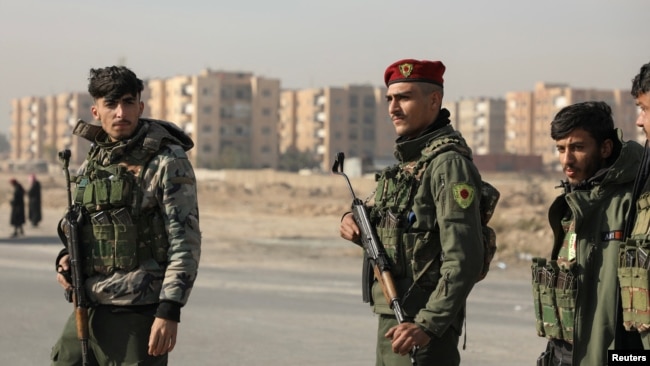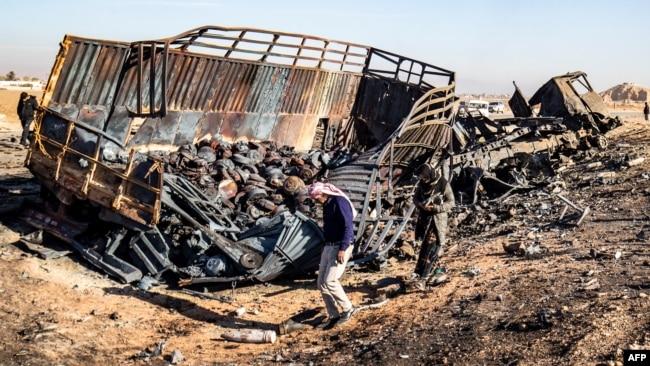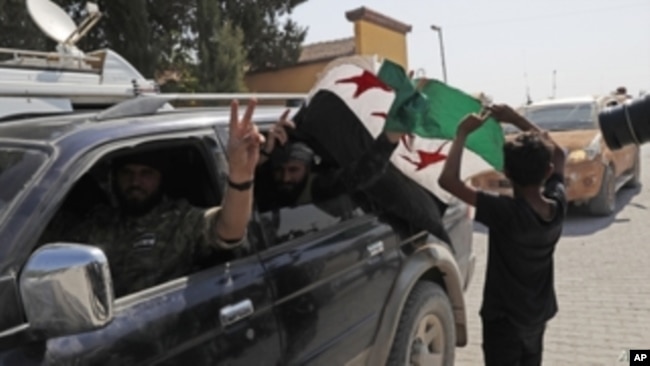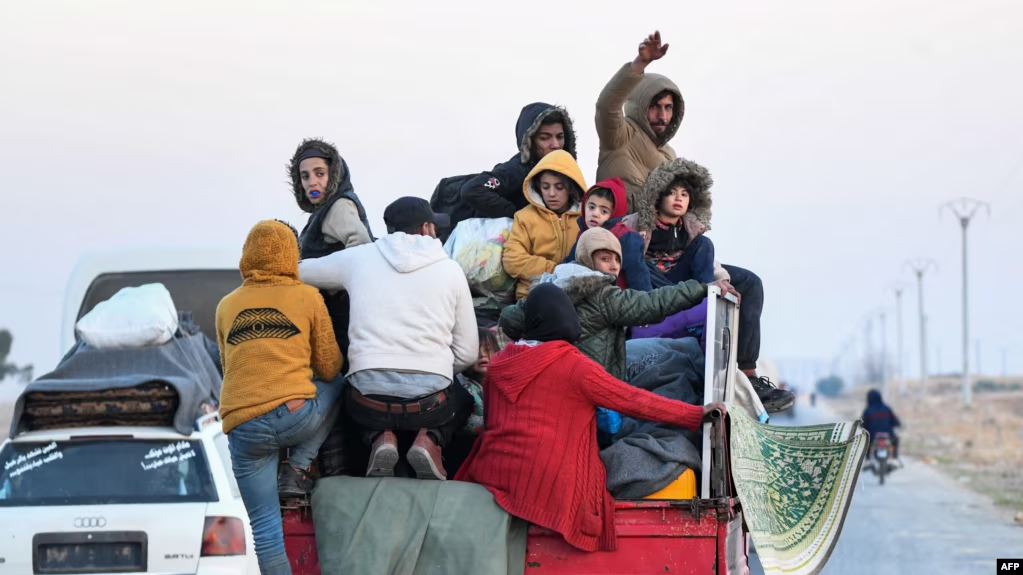WASHINGTON —
Israeli government officials have intensified calls to protect Syria’s Kurds as they face armed groups backed by Turkey following the sudden collapse of Syrian President Bashar al-Assad’s regime.
An 11-day rebel offensive, led by Hayat Tahrir al-Sham, a U.S.-designated terrorist organization, resulted in the capture of the capital, Damascus, and other strategic cities in northwest and central Syria.
Now, an operation led by Turkish-backed factions is aimed at dislodging Kurdish forces from parts of Aleppo province, including the town of Manbij.
The Kurdish-led Syrian Democratic Forces, or SDF, have been a major U.S. partner in the fight against the Islamic State terror group. The partnership led to the liberation of most territory once controlled by Islamic State in Syria.

Israeli Foreign Minister Gideon Sa’ar said Monday that Turkish-backed attacks on Syria’s Kurds must be stopped.
“It’s a commitment of the international community towards those who fought bravely against ISIS,” Sa’ar said during a press briefing in Jerusalem. “It’s also a commitment for the future of Syria, because the Kurds are a stabilizing force in this country.”
The top Israeli diplomat said they were discussing this issue with the United States and other countries.
Since the ouster of the Assad regime, the Israeli military said it has carried out hundreds of strikes in Syria, targeting weapons stockpiles across the country. Israeli officials said the airstrikes were aimed at preventing strategic weapons from falling into the wrong hands amid the ongoing chaos.
Israel has also deployed ground troops beyond a demilitarized buffer zone between the two countries. Israeli officials described these measures as temporary, pending a resolution of the political situation in Syria.

The Turkish government, a main backer of the Syrian rebels, views the SDF as an extension of the Turkey-based Kurdistan Workers’ Party, or PKK, which is designated a terrorist organization by Turkey, the U.S. and the European Union. Washington, however, makes a clear distinction between the two Kurdish groups.
Salih Muslim, a senior Kurdish politician with the Democratic Union Party, the de facto ruling party in northeast Syria, welcomed the recent statements by Israeli officials expressing support for the Kurds, describing the position as a positive and encouraging step.
“Undoubtedly, any force that defends our rights is welcomed,” he said in an interview posted Tuesday on X by a London-based journalist. “Israel’s stance is correct; they have seen our actions and understand that we have never denied the existence of the Jewish people in the Middle East. It is encouraging to see those who recognize our pain and suffering. … Beyond verbal support, we await practical measures,” Muslim said.
Michael Rubin, a senior fellow at the American Enterprise Institute, said these mutual statements are welcome and build confidence.
“But when the Kurds are under fire by the Turkish army and their militias, no one has time for the courtship,” he told VOA. “The two sides need a shotgun wedding, or else it will simply be too late. Kurds need Israeli weapons, not words.”
The group battling SDF fighters in northern Syria is the Syrian National Army, or SNA, which is not the official Syrian armed forces but rather an umbrella organization for Turkish-backed militias. The SNA previously participated in offensives against Kurdish forces in 2018 and 2019.

While the fighting in Manbij appears to have paused following a U.S.-brokered ceasefire early Wednesday, attacks continue elsewhere in the region, said Mazloum Abdi, the top SDF commander.
The ceasefire in Manbij is intended to allow SDF fighters to withdraw from the city, which has been captured by the SNA, Abdi said in a statement.
Militias backed by Turkey appear intent in their efforts to drive Kurds from their homes, said Seth Frantzman, a Jerusalem-based adjunct fellow at the Foundation for Defense of Democracies.
“Israel has influence with the U.S. and should use it to make sure Ankara stops its attacks,” he told VOA.
Israel and Syria don’t have diplomatic ties. Under Syrian law, any interaction with Israel by a Syrian citizen or group is considered high treason. Additionally, the topic of Israel remains a taboo in Syrian society.
However, Kurds in Syria and elsewhere in the Middle East generally hold a more positive view of Israel.
Experts warn that recent Israeli statements could potentially harm the Kurds if not backed by concrete actions.
“Arabs and Muslims in Syria and elsewhere in the region already view the Kurds with suspicion on this issue. The popular and official narrative in many societies across the region portrays the Kurds as a ‘second Israel,’” John Saleh, an analyst of Kurdish affairs, told VOA.
“So, if Israel has a plan to support the Kurds, it should execute right away,” Saleh said. “Otherwise, the consequences for the Kurds of this perceived association with Israel could be severe under the new Islamist regime in Damascus.”
Saleh added that Turkey could also use this as a pretext to further mobilize Islamist militias against Kurdish civilians.
Related
- Syrian former prisoners speak out on Assad regime’s collapse
- Blinken travels to Mideast as Syria navigates post-Assad path
- Syrian celebrations overshadow concerns of more strife
- Russia monitoring situation in Syria, highlights need to protect its military bases
- Syrian minorities want say in country’s future
More Middle East News
- VOA Kurdish: Kurdish MPs advocate for action amid Syrian unrest to protect Kurdish rights
- VOA Kurdish: Despite ceasefire, fighting continues in Manbij, Syria
- US signals conditional support for future government in Syria
- UN General Assembly demands immediate Gaza ceasefire, release of hostages
- Turkey assists with evacuations of foreign nationals from Syria
The Day in Photos
Continue reading
Most Viewed
Syrian former prisoners speak out on Assad regime’s collapse
2Botswana’s president promises to restore Bushmen rights after yearslong delay in burial3Bill to protect journalists fails in US Senate4Israel urges action to protect Syria’s Kurds
Worldwide in Five
December 11, 2024 – 1400 UTC
The code has been copied to your clipboard.
The URL has been copied to your clipboard
No media source currently available
0:005:000:00
